Farmer John Writes: Is a Farm a Being?
Harvest Week 8, August 11th – 17th, 2020
Baby Greens Coming Soon
Soon, baby greens will be coming your way—eight beds of them: three of arugula, three of baby lettuce, and two of baby chard, this after trying again and again to bring you baby greens, tearing up bed after bed because of weeds.
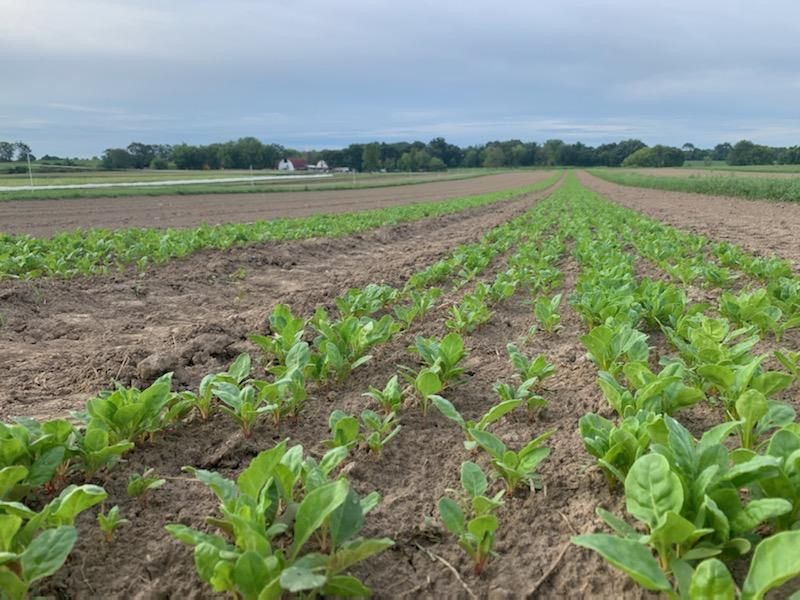
baby chard
Did we finally beat the weeds? I don’t know. Maybe they simply subsided because it is now later in the season, and there is less growing power available to them. The baby greens that are coming on have been seeded to baby greens two or three prior times this season, and those crops were lost to a proliferation of weeds. Now the weeds in those crops are manageable, maybe 5 or 10% the population what they were prior. Now it costs maybe $100 per bed to weed them, vs well over $1,000 per bed earlier in the season.
There is still pressure from quickweed, also known as galinsoga. If you find some in your bag of baby greens, know that we tried to keep it out. Also know that it is sometimes served in salads or smoothies, so maybe you will welcome it.
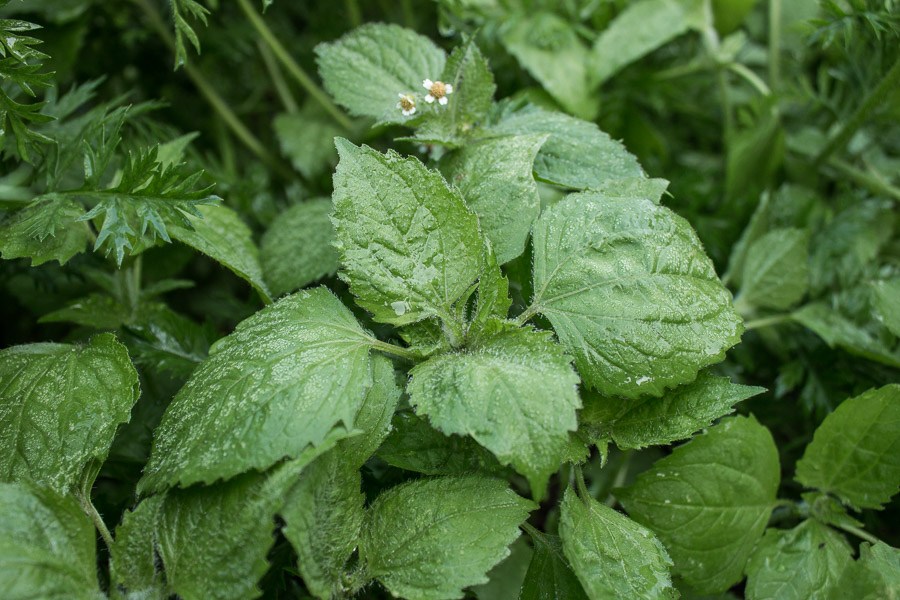
galinsoga
This Week
Arugula should be available for deliveries later in the week, though that will depend on the weather. Rain is forecasted and might prevent harvest. Some of the leaves were damaged by flea beetles early on, but the leaves that came later are mostly unscathed. If some of your leaves have holes from flea beetle damage, it won’t hurt you to eat them, but also feel free to discard them.
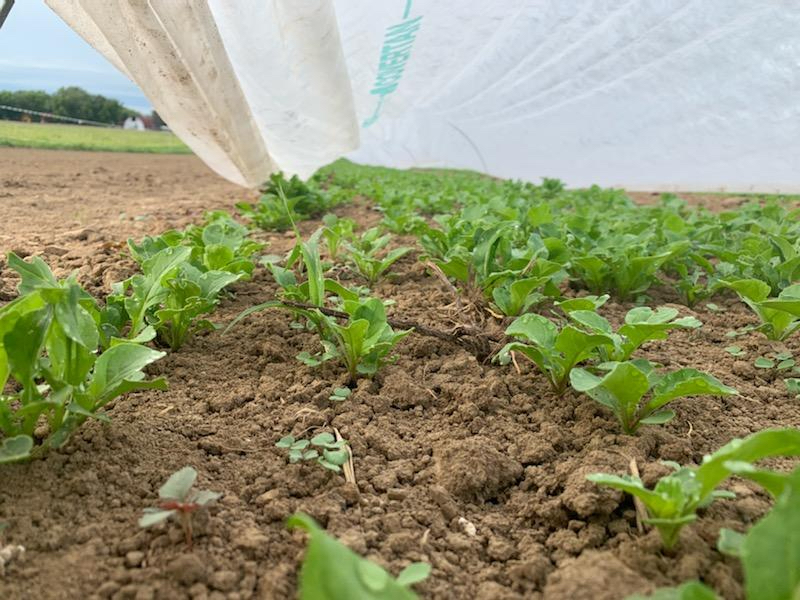
arugula under row cover protecting against flea beetles
More Yet
I have subsequently seeded many more beds of baby greens in these same fields—mizuna, spinach, pea shoots, more baby lettuce. I suspect that these crops will also not be subject to the overwhelming weed pressure that prevailed earlier in the season. (For those of you who think it’s too early to seed spinach, because it won’t germinate in hot August weather, the forecast for temperatures this August is for mild daytime temperatures and downright cool evening temperatures.) Also seeded are cilantro, dill, daikon radishes, easter egg radishes and turnips.
What’s Fair?
Occasionally a shareholder will write to suggest that any extra crops from the CSA should not be sold as extras through the Harvie system; the person claims that these crops rightfully belong to the CSA shareholders at no extra cost. This issue has come up over the years. I will point out that many CSA farms grow for wholesale markets and also for farmers’ markets, so the idea that everything grown on a CSA farm belongs to the shareholders is not applicable.
Another consideration is that this year, for example, I suppose an extra $70,000 or more has gone to unanticipated weeding expenses, and probably another $10,000 to $20,000 to re-seeding crops, then re-seeding again. It is no more justified to say that the farm owes the shareholders all of its crops than it is to say that the shareholders owe the farm extra money because of the adversity encountered in a given year. I will add, though, that on occasion a shareholder takes mercy on the farm when we encounter extreme hardship and sends us a check to help with the unanticipated expenses, a most generous act.
These ideas of what is fair are always interesting, and they become much more interesting and nuanced when carefully examined. This year, for instance, some crops are growing in unprecedented abundance; some have failed again and again. The bounty ideally balances out the losses, but it would be most difficult to tally all of this in a ledger.
This Reminds Me of What’s Possible
Brook Le Van, head rancher at Sustainable Settings in Carbondale, Colorado, stopped by the farm recently after procuring an Allis G cultivating tractor east of here. I met Brook at the Utah Farm & Food Conference in Southern Utah this past February. At the conference, he presented on—well, I suppose I should just say it outright—esoteric agriculture to an assembly hall of mostly Mormons. Brook provided much documentation of the success of his exotic practices to this practical and discerning group of hard-working, no-nonsense farmers and ranchers, and he wowed them with his research and his evidence. A Mormon rancher presented on his application of Brook’s methods on his 20,000-or-so acre spread and the ensuing transformation of his land, the positive impact on the health of his cattle and on his finances.
Brook has been quite influenced by Rudolf Steiner’s work, especially in the realm of agriculture which today is presented as Biodynamics, based on a series of lectures given to farmers by Steiner in 1924. As Brook has noted, though, Steiner planned to give an additional series of lectures on agriculture, but this never materialized due to Steiner’s passing. I feel that Brook embodies the work that Steiner would have offered up in this second set of lectures which never materialized. I suppose we could call it Beyond Biodynamics. I take warmly to Brook’s methods, as I have been interested in esoterica since about the time I started reading at 6 or 7 years old. (I must say that I also got my very practical mother interested at about the same time, or at least intrigued.)
Anyway, I am bringing this up to you about Brook because he said something that impressed me deeply. He said, “The film, The Biggest Little Multi-Million Dollar Farm, should have been more transparent about all the money that was poured into creating that agricultural paradise, because it gave the impression that the enterprise was much more bootstrap than it actually was. It wasn’t wrong that the farm was flooded with capital, it just should have been made more clear that this was the case. Farms all over are trying, crying, to be sustainable, but they don’t have the resources. If capital were to flow into farms striving for balance and sustainability the way it flowed into that farm in the film, the problems of the planet would be over.”
Have I Dedicated My Whole Life to a Being or a Thing?
I spent five years touring with the film about my life and my farm, The Real Dirt on Farmer John, offering a somewhat similar message as Brook, that farms need engagement and support, and support could be in the form of people being willing to pay more for food from sustainable farms. Of course, direct infusions of capital would provide more immediate results, but my message while on tour was “Nurture the farm and the food will follow.”
I endeavored to show people just how extraordinary farms can be, as individualities, as self-contained organisms, as beings–not as things, not as production facilities. A farm is a place that throbs with life: crops reach for the sun, wagons creak, muscles bulge, trucks purr, tractors roar, birds sing, rains splash, workers laugh, barns preside, trees loom…
For more about the farm as an individuality, a being, read my essay The Barn is There.
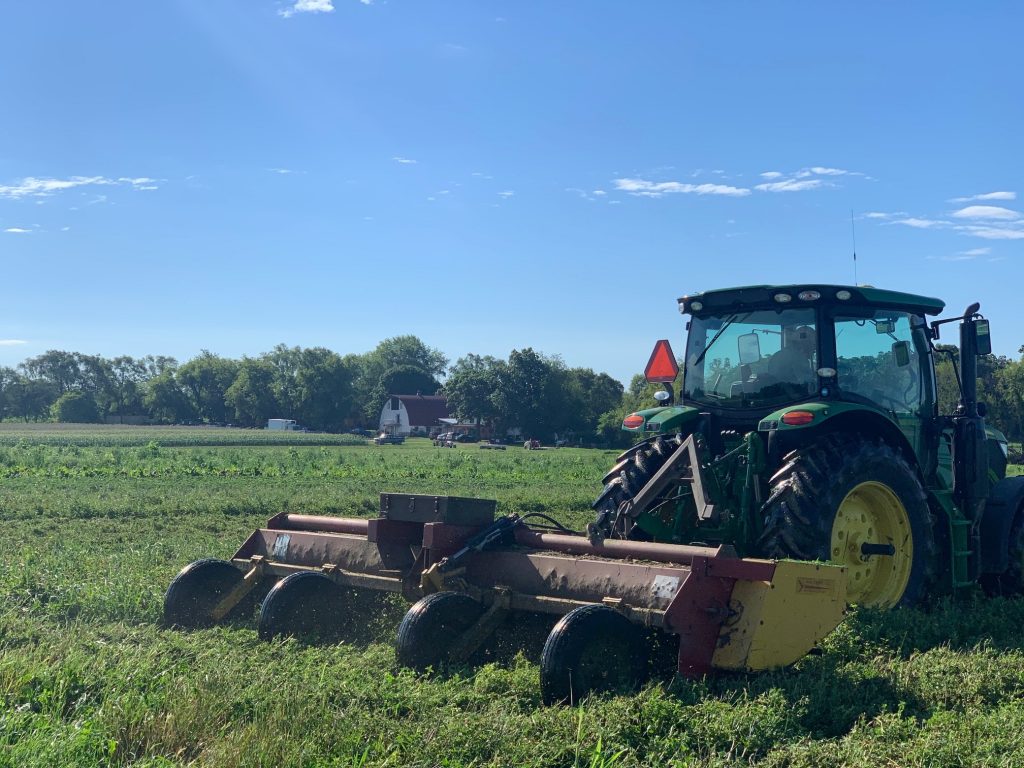
nurturing the being of the farm with a diversity of cover crops—clover, alfalfa and timothy
Biodegradable Box Liners
Many of you have inquired about the box liners that your vegetables are placed in. We cannot re-use them, so please don’t return them to the farm.
They are designed to biodegrade in a variety of situations including:
- Home Composting
- Commercial Composting
- Landfills
- Buried in, or in contact with the soil
Our U-Pick Garden is Now Open
Learn more on our U-Pick Garden page.
Warmly,
Farmer John
-
[…] Week 8 of Farm News, 2020, Is the Farm a Being?, I explore the question of whether the farm is a thing or a living organism. It’s not especially […]
Leave a Comment
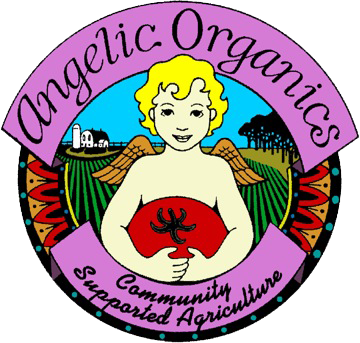
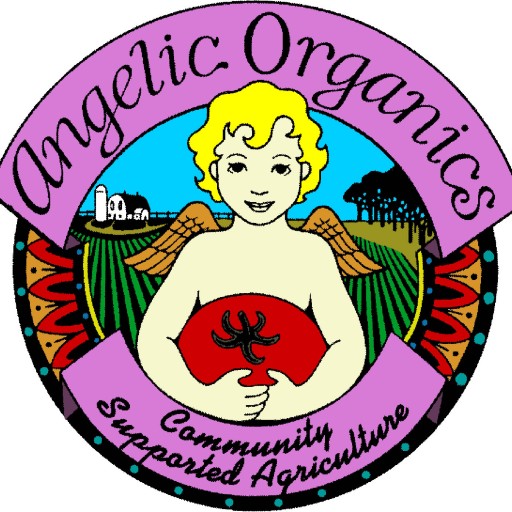
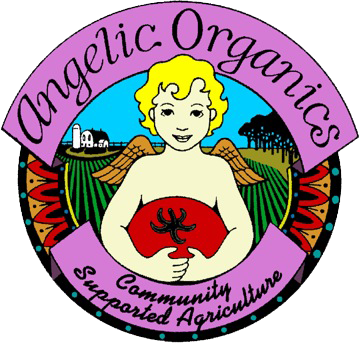

Maybe this is a few weeks late, but just wanted to say that as first-time CSA participants, we have loved the customization features and flexibility of this program. A CSA has been something I’ve wanted to try for years. Our kids are typically very good eaters and we wanted the experience of being introduced to new produce that we haven’t tried before, plus being able to enjoy veggies harvested at the peak time. We didn’t put a lot of things on our “do not give us” list, but it was a relief to know that our box would not be filled with green peppers (the one veggie that our family really can’t stand!). It’s been an adventure each week, learning about how to use anise hyssop, discovering a great way to prepare kohlrabi, getting our hands stained with beets. I can’t help but gush to my friends and colleagues about how much we’ve enjoyed our CSA experience! To my surprise, many of them have tried it in the past and they were amazed to learn how much/or little (!) customization we can choose. Because this was largely the reason why they did not continue and did not enjoy it. Being able to swap items each week (if desired) is also nice because sometimes we want a slightly larger quantity of something. Anyway, just wanted to say that we’ve been loving our first-time experience, and eagerly look forward to picking up our box this week!
April,
What a great message from you. Thank you for elaborating on your experience of and preference for customization. It is quite illuminating. I like your adventurous spirit.
First, thank you for your poetry “A farm is a place that throbs with life: crops reach for the sun, wagons creak, muscles bulge, trucks purr, tractors roar, birds sing, rains splash, workers laugh, barns preside, trees loom..” As I sit at our oak dining room table reading your words, I am transported to the Farm. This oak table purchased with the bargaining assistance of my father (who farmed in the 1950’s and early 1960’s) as my now-wife and I were to be married 27 years ago. This table where we enjoy the fruits of the Farm.
“What’s Fair?”: I’ve been reflecting a lot lately on individualism and communitarianism. Mask usage has been the impetus for this reflection. Is the focus on individual independence being selfish? Do we have a responsibility to each other? How do we express our individual self while being respectful of others? My wife and I each have family roots of farming. We joined Angelic Organics many years ago to share the risk and reward of the farm and to be connected to that life from which we are long removed. I appreciate, Farmer John, your transparency on the question of “What’s Fair?”. We join each year as a trust in your – and your team’s – leadership. It is not a commodity to us. Should it also be more than a commodity for all other Shareholders? I hope so. I hope that part of belonging to a CSA is relationship.
On Saturday mornings we prepare to go grocery shopping. I am always glad to learn what will come in the box so I don’t buy produce that will soon be here from the Farm. Today I was planning to grill beets – which came from the Farm – marinated in an herb, garlic, and balsamic vinegar. As I’m pulling out jars of dried herbs, my wife reminds me we have fresh thyme, sage, and basil from the Farm. Now I’m putting the jars back in the spice drawer. Oh, and one of the jars I found was sage from the Farm dated 2007-2008! Glad to have the fresh version. Thank you
Wow, Mark. I am very moved by your post. You ask questions without pushing for answers, just letting the questions be. It is an art to be in the questions, a virtue, and not to force an answer. You seem like a kindred spirit, and your table seems most special.
One might consider the “value” of the box not only in the vegetables contained therein but the value from trying a new recipe, a new vegetable, a new cooking or preparation experience with a loved one. That’s in addition to the weekly value added by your commentary and thoughts about managing the farm and the connection to it. In consideration of all those, it adds up to a tremendous value.
Also, the arugula and garlic are worth their weight in gold.
Marty, I had a similar thought in response to this matter, if not the same. What we “get” as shareholders is not the same as what we pay for. Similar to how we do not expect to be paid for every single thing we have to offer others in life. But an important part of acting in cooperation is that we share in both the risks and rewards as they come — not because we are entitled to the rewards, but to make sure the risk isn’t more than any of us can bear. To see “extra” crops as a reward in isolation from the rest of the events of the season leaves the farm open to greater risk.
Some seasons, I get less of the farm’s soil in my bags of potatoes than other years. I love getting that little bit of soil delivered to my home. The larger clumps go in my potted plants, & the rest gets under my fingernails as I scrub the potatoes in my sink. But I know we all get more from it when it stays at the farm.
Skylar, I love your observation about our soil–most special and poetic. I struggle with the distinction between me and the other. Are we not all united? Are we not each of us responsible for all, all responsible for each of us? Well, yes, no, kind of. One of my least favorite sayings is “Glad that’s not my problem.” Is there any problem of another human being that is not my problem? This is an eternal question, and the answer varies from epoch to epoch, culture to culture.
Marty, value is an interesting, unavoidable consideration, even if it’s not monetary value that is being considered. Thanks for valuing us. Glad you like our arugula and garlic–more to come.
I found your “What’s fair” section interesting. This is the first year that we purchased a CSA and we have been happy with the quality of our food. I recently noticed on your web page that you were offering additional peak summer shares for purchase due to a bountiful harvest. As of 8/10 this is the current message on your website: “Sorry, peak summer share sales are currently closed. Check back in a few days to see if we open share sales up again.”
My understanding of a CSA is that shareholders agree to pay an upfront fee giving the farmer income to begin the season and share the risk of production. Since the risk is shared, wouldn’t it follow that shareholders should also benefit when crops are better than expected? If the harvest was particularly bad I would not expect a refund. So why do shareholders assume downside risk but do not benefit on the upside?
It’s complicated. I plant 10 to 15% more than what I think I need for my CSA shareholders as a buffer in case of crop losses. In the past few seasons, crop losses have unfortunately exceeded that 10 to 15%. This year, many fields have been completely lost to weeds, but the other crops have more than made up for it. The 10% to 15% extra that I planted this year as a buffer for shareholders is really paid for out of my pocket. I can’t stand a shareholder shortfall, so I overplant. But, this year, that 10% to 15% has come to fruition, so I am entitled to offer it to additional shareholders. There are many ways of viewing the economics underlying a CSA. Our farm has many, many needs in the areas of infrastructure and equipment, and I would prefer that shareholders rejoice that we can sell a little extra this year. I even had eaves troughs installed on the outbuildings this year that were 63 years overdue; there was simply never enough money to install them over the years, or, I suppose I could say, that other things came first year after year.
I’m new to Anise Hyssop and would love to hear some ideas on how other shareholders or providers have used w/ success. I love the wonderful tarragon-like smell.
Shred leaves and sprinkle onto vanilla ice cream.
That sounds simple and delicious! Another great and simple pairing I’ve discovered is simply placing a whole leaf right on top of a scantly salted thick sliced and quartered Cherokee purple tomato. Beautiful herb/plant that I had not known about, but happy to not have passed on.
https://www.npr.org/2020/07/30/892366385/big-money-investors-gear-up-for-a-trillion-dollar-bet-on-farm-land
Interesting listen to add dimension to this week’s newsletter
Remote or absentee ownership of farmland will likely commoditize our planet even further, at best reduce it to an abstract idea or a dry concept–at worst, have it be a cold-hearted, hard-working investment. First and foremost, farmland needs to be loved if we are going to restore and revitalize the earth. I presented once on the topic of money/capital in organic agriculture, return on investment, etc. My presentation didn’t go well. I think I wrote about it in a newsletter a while back, but can’t remember which one, or maybe I just thought about highlighting it in a newsletter, but thought better of it.
I hope the farm was not damaged by the derecho on Monday. Looking at maps, it seems like the storm came uncomfortably close to the Caledonia area.
No damage, other than some shredded chard leaves. Usually a storm like that will knock out our power, but not this time. Thanks for thinking about us.